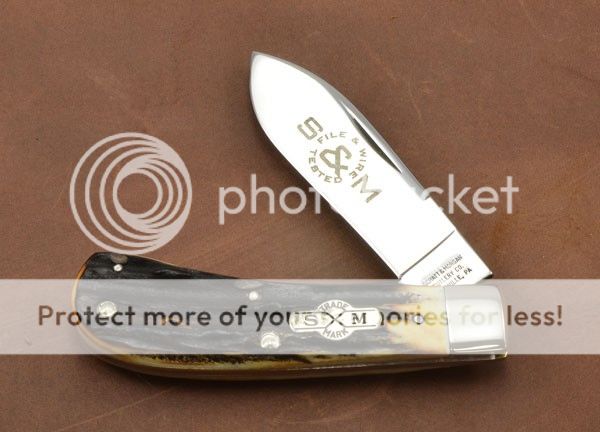- Joined
- Mar 3, 2006
- Messages
- 7,132
It all started like this. I bought a Schatt & Morgan slip-joint in D2, shown below.

As you will notice, it has lots of belly (which I like) and a spear point, which I like as well. The only problem is that it came dull as a stick of butter. I thought that I could simply sharpen it up with my Lansky set. What I discovered, was not only couldn't I get the knife sharp, the angle seemed to vary from the middle to the shoulder and tip. In addition, the stones just seemed to 'skate' on the steel. So, the next thing I tried was a set of Lansky Crock sticks. Same story. I couldn't get the sticks to bite the hard D2. My beautiful knife languished in a drawer for months, until today when I tried something completely different. I dragged out my Lansky set, grabbed a medium hone and proceeded to free-hand sharpen with the hone in one hand and the knife in the other. I cycled through extra fine and a leather strop. Lo and behold, a shaving sharp edge on my D2 blade. Just to prove to myself this wasn't a fluke, I sharpened a ZDP-189 Endura with the same results.
What makes the above particularly interesting, is that I have never free-hand sharpened before. So now I am going ape on all my 'super steel' knives that just frustrated me before. Now I am a D2 fan, looking for some bench stones. With this in mind, I am considering some Arkansas stones or some Spyderco bench stones. Any suggestions?

As you will notice, it has lots of belly (which I like) and a spear point, which I like as well. The only problem is that it came dull as a stick of butter. I thought that I could simply sharpen it up with my Lansky set. What I discovered, was not only couldn't I get the knife sharp, the angle seemed to vary from the middle to the shoulder and tip. In addition, the stones just seemed to 'skate' on the steel. So, the next thing I tried was a set of Lansky Crock sticks. Same story. I couldn't get the sticks to bite the hard D2. My beautiful knife languished in a drawer for months, until today when I tried something completely different. I dragged out my Lansky set, grabbed a medium hone and proceeded to free-hand sharpen with the hone in one hand and the knife in the other. I cycled through extra fine and a leather strop. Lo and behold, a shaving sharp edge on my D2 blade. Just to prove to myself this wasn't a fluke, I sharpened a ZDP-189 Endura with the same results.
What makes the above particularly interesting, is that I have never free-hand sharpened before. So now I am going ape on all my 'super steel' knives that just frustrated me before. Now I am a D2 fan, looking for some bench stones. With this in mind, I am considering some Arkansas stones or some Spyderco bench stones. Any suggestions?
